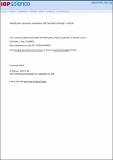Hamiltonian quantum simulation with bounded-strength controls
Author(s)
Bookatz, Adam D.; Wocjan, Pawel; Viola, Lorenza
DownloadBookatz-2014-Hamiltonian quantum.pdf (1.212Mb)
PUBLISHER_CC
Publisher with Creative Commons License
Creative Commons Attribution
Terms of use
Metadata
Show full item recordAbstract
We propose dynamical control schemes for Hamiltonian simulation in many-body quantum systems that avoid instantaneous control operations and rely solely on realistic bounded-strength control Hamiltonians. Each simulation protocol consists of periodic repetitions of a basic control block, constructed as a modification of an 'Eulerian decoupling cycle,' that would otherwise implement a trivial (zero) target Hamiltonian. For an open quantum system coupled to an uncontrollable environment, our approach may be employed to engineer an effective evolution that simulates a target Hamiltonian on the system while suppressing unwanted decoherence to the leading order, thereby allowing for dynamically corrected simulation. We present illustrative applications to both closed- and open-system simulation settings, with emphasis on simulation of non-local (two-body) Hamiltonians using only local (one-body) controls. In particular, we provide simulation schemes applicable to Heisenberg-coupled spin chains exposed to general linear decoherence, and show how to simulate Kitaevʼs honeycomb lattice Hamiltonian starting from Ising-coupled qubits, as potentially relevant to the dynamical generation of a topologically protected quantum memory. Additional implications for quantum information processing are discussed.
Date issued
2014-04Department
Massachusetts Institute of Technology. Center for Theoretical PhysicsJournal
New Journal of Physics
Publisher
Institute of Physics Publishing and Deutsche Physikalische Gesellschaft
Citation
Bookatz, Adam D, Pawel Wocjan, and Lorenza Viola. “Hamiltonian Quantum Simulation with Bounded-Strength Controls.” New Journal of Physics 16, no. 4 (April 25, 2014): 045021.
Version: Final published version
ISSN
1367-2630